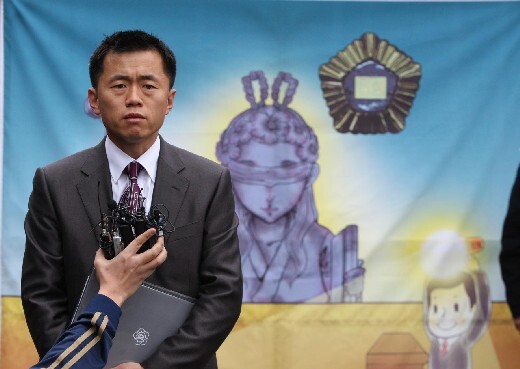hankyoreh
Links to other country sites 다른 나라 사이트 링크
Citizens who led ad company boycott get criminal convictions

Citizens who had used the Internet to encourage a boycott of companies that advertise with the Chosun Ilbo, the JoongAng Ilbo and the DongA Ilbo because of the newspapers’ coverage of the public campaign to stop the resumption of American beef imports were convicted of crimes.
On February 19, Seoul Central District Court found an individual by the surname Lee to be guilty of the crime of “obstruction of business” because “it was illegal pressure that went beyond the limits of a legitimate consumer campaign.”
The court gave Lee a two-year suspension on a 10-month prison sentence for, among other acts, creating an online group at the Korean portal website Daum called the “National Campaign of Sovereign Consumers of News Media.” Four others were given similar sentences, while nine persons were fined between two and three million won (between US$1,332 and $1,998) and another 10 were fined one million won (US$670).
The decision will likely be criticized for what would appear to be ignoring the market economy principles of having consumer opinion reflected in managerial decisions.
The decision will also likely face criticism for having found consumers guilty for boycotting the companies that advertise with those three papers, and ignoring basic market economic principles for giving weight only to the rights of advertisers while disregarding consumer rights and opinion.
Judge Yi Rim said the consumers’ goal in telephoning companies and demanding that they stop advertising with the three large-circulation newspapers was in fact to “correct distorted news reports and not to close the newspapers down.”
“The effects of having limitations on their business operations because consumers put lists of advertisers (on the Internet) and conveyed their opinions to those companies is something newspapers have to put up with,” wrote the judge in the decision. However, “it qualifies as obstruction of the free ability to conduct business if threats and displays of force lead to the cancellation of advertising contracts.”
The decision, therefore, effectively recognizes as legitimate only consumer actions that are permitted by the court. It views consumers’ views as a form of “pressure” and recognizes managerial decisions to stop advertising as a normal process, while at the same time essentially letting it be known that it becomes a crime if the court sees the action as an exertion of forced power.
“The part about the judge’s decision that says legitimate consumer campaigns have to be protected contradicts the part where it argues people should only engage in boycotts that are permitted by prosecutors and judges,” said Korea University law professor Kim Ki-chang. “You arrive at the conclusion that consumer actions can be controlled by the government any time it wants to.”
The basis for the decision is also being criticized as having been arbitrary. Yi wrote that since a large number of people telephoned advertisers hundreds of times, and since the online group posted specific methods of protesting, the action was “ample in restricting the freedom of the companies that suffered” damage.
“You can’t have a consumer campaign if companies see consumers’ views as forced power,” said Park Kyong-sin, also a law professor at Korea University.
“This decision goes against market economic principles for defining the opinions of a large majority of consumers as illegal,” said Park.
Please direct questions or comments to [englishhani@hani.co.kr]
Editorial・opinion
![[Column] Is Korean democracy really regressing? [Column] Is Korean democracy really regressing?](https://flexible.img.hani.co.kr/flexible/normal/500/300/imgdb/original/2024/0705/2917201664129137.jpg) [Column] Is Korean democracy really regressing?
[Column] Is Korean democracy really regressing?![[Column] How tragedy pervades weak links in Korean labor [Column] How tragedy pervades weak links in Korean labor](https://flexible.img.hani.co.kr/flexible/normal/500/300/imgdb/original/2024/0703/8717199957128458.jpg) [Column] How tragedy pervades weak links in Korean labor
[Column] How tragedy pervades weak links in Korean labor- [Column] How opposing war became a far-right policy
- [Editorial] Korea needs to adjust diplomatic course in preparation for a Trump comeback
- [Editorial] Silence won’t save Yoon
- [Column] The miscalculations that started the Korean War mustn’t be repeated
- [Correspondent’s column] China-Europe relations tested once more by EV war
- [Correspondent’s column] Who really created the new ‘axis of evil’?
- [Editorial] Exploiting foreign domestic workers won’t solve Korea’s birth rate problem
- [Column] Kim and Putin’s new world order
Most viewed articles
- 110 days of torture: Korean mental patient’s restraints only removed after death
- 2Months after outcry over “torture devices,” Justice Ministry proposes more restraints for immigratio
- 3Beleaguered economy could stymie Japan’s efforts to buoy the yen
- 4[Column] Is Korean democracy really regressing?
- 5Koreans are getting taller, but half of Korean men are now considered obese
- 6[Column] How tragedy pervades weak links in Korean labor
- 7Former bodyguard’s dark tale of marriage to Samsung royalty
- 8Real-life heroes of “A Taxi Driver” pass away without having reunited
- 9[Editorial] Exploiting foreign domestic workers won’t solve Korea’s birth rate problem
- 10Democrats ride wave of 1M signature petition for Yoon to be impeached